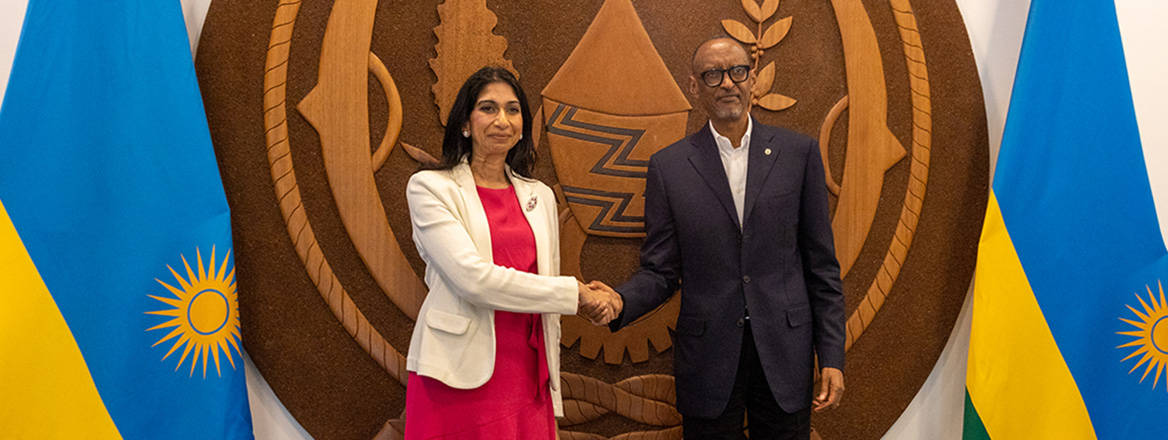‘Stop the Boats’: The Rwanda Policy and Global Britain
UK Prime Minister Rishi Sunak has pledged to reduce the number of migrants attempting to enter the UK via small boats departing from France. Such a policy is legally, ethically and financially questionable and will have a significant impact on the UK’s international reputation.
The total number of recorded crossings of the English Channel by migrants rose from 299 in 2018 to 45,755 last year. At least 52 people have drowned in the Channel while trying to reach the UK over the same five-year period. Small boat arrivals have been increasing in recent years, prompting Home Secretary Suella Braverman to warn of an ‘invasion on our southern coast’ and leading the government to announce plans to send ‘anyone who enters the UK illegally’ to Rwanda to claim asylum there or else seek refuge in another third country. To put the ‘invasion’ in context, in 2022, the UK received 74,751 asylum applications from 89,398 people and their dependents, the highest annual figure since 2002 (in addition to applications from Ukrainian nationals who arrived in the UK under schemes created by the Home Office). Although the numbers are high, they place the UK fifth in terms of asylum applications in Europe in 2022 – behind Germany, France, Spain and Austria, with Germany receiving approximately two-and-a-half times the number of applications of the UK.
Braverman’s use of inflammatory language perpetuates harmful narratives and overlooks the complicated dynamics driving irregular migration. Similarly, the Rwanda policy is justified as asserting control of UK borders, but contributes to the dehumanisation of asylum seekers and anti-immigrant rhetoric, while ignoring important factors such as the contribution refugees make to UK society and how the lack of safe, legal routes for seeking asylum in the UK drives small boat arrivals.
The government has admitted that the cost of sending migrants to Rwanda will be the same as housing them in the UK and therefore will not represent a saving for taxpayers. The plan will also have much wider ramifications, as it overlooks the UK’s international obligations, risks facilitating human rights abuses against asylum seekers, and will damage the UK’s global reputation.
Seeking Asylum
Seeking asylum is a legal process which, per the 1951 Refugee Convention, does not need to be initiated in the first safe country a person reaches. While crossing borders without adequate documentation is not inherently legal, it becomes legitimate once a person initiates the asylum process. The UK’s plans to label asylum applications as ‘inadmissible’ due to time previously spent in third countries is directly contradictory to established international legal procedures.
The Dublin Regulation was established in the EU to coordinate asylum applications and reduce ‘orbiting’ asylum seekers being transferred from state to state. This would have allowed the UK to return some applicants to the state in which they were first documented, as well as providing a route to reunite separated families. However, with Brexit, the UK left the Dublin Regulation, contributing to the government’s desperation to find alternative solutions.
An Australian policy similar to the Rwanda plan, which sought to resettle asylum seekers in Cambodia, managed to successfully relocate just two refugees at a cost of $55 million
The past decade of anti-immigration policies has left significantly fewer safe and regular pathways available for migrants to enter the UK. This potentially forces migrants into dangerous or criminal behaviours due to a lack of other viable options. It also creates a system that can be abused or misused due to lack of regulation. In addition, it may increase pressure on ‘frontline states’, damaging already tenuous political relationships in the aftermath of Brexit.
International law and regulatory bodies were established in the wake of the Second World War to facilitate cooperation and help ‘those most vulnerable to abuse, oppression, and harm’. The UK cannot maintain international legitimacy in the face of political insecurity and war on Europe’s borders while failing to uphold the procedures it helped to establish generations prior.
Unworkable?
The government hopes that the Rwanda policy will deter people from attempting to seek asylum in the UK when other ‘safe third country options’ are available, despite the disparity between arrivals in the UK and the capacity of Rwanda’s asylum system, which means that only 1–2% of those who arrive on small boats would face the risk of being transferred to Rwanda. The fact that boat crossings have risen since the policy was announced further suggests that any deterrent effect is likely to be minimal. Even if the policy is able to stop the boats, it is unlikely that it will stop those committed to attempting to reach the UK. Evidence suggests an uptick in the numbers returning to the use of lorries travelling through the Channel Tunnel. This route is not necessarily safer, as the cases of 58 Chinese people found dead in the back of a lorry in Dover in 2000, and a further 39 Vietnamese victims found in a refrigerated lorry unit in Grays, Essex in 2019, illustrate.
Other countries demonstrate the pitfalls of such an approach. Australia’s system has been accused of human rights violations and linked to high rates of suicidal ideation and mental health issues, while costing vast sums of money. Although apparently successful in its goal, the specific impact of offshore asylum processing itself is debated. An Australian policy similar to the Rwanda plan, which sought to resettle asylum seekers in Cambodia, managed to successfully relocate just two refugees at a cost of $55 million. Meanwhile, in 2019, Israel scrapped a policy that saw it relocate thousands of failed asylum seekers to Rwanda and Uganda, many of whom had travel and identity documents taken away and were refused the right to stay, forcing them to take treacherous onward journeys in search of safety.
The UK is planning to implement a policy for which there is little evidence, one that ignores its international obligations and risks the abuse and mistreatment of vulnerable people who are seeking a better life
This highlights the likelihood that the Rwanda policy will merely displace criminal networks and delay asylum seekers, rather than deterring them altogether. Those relocated to Rwanda are likely to face similar hardships, with recent revelations of migrants being killed by Rwandan law enforcement further illustrating the human rights risks associated with the policy. The functionality of such a scheme is therefore debatable, but the negative impact it will have on the lives of those seeking refuge is clear.
Global Britain
The UN Refugee Agency has called the UK’s memorandum of understanding – a process which bypasses parliamentary scrutiny and is not legally binding – a ‘clear breach’ of the Refugee Convention. However, the UK government has ignored such warnings, despite its legal and ethical obligations as a signatory state to the Refugee Convention. It has also disregarded alternative suggestions for managing the increase in asylum seekers, such as re-joining the Dublin Regulation – despite acknowledging its failure to implement safe and legal routes for those seeking asylum. Instead of acting in accordance with its international obligations, the UK is justifying sending asylum seekers on a one-way flight to Rwanda using logic that essentially comes down to ‘the ends justify the means’.
Yet this policy directly contradicts the vision of Global Britain as ‘a force for good: supporting open societies and defending human rights’. The UK’s colonial past and more recent extensions of power – both hard and soft – across the globe have arguably helped make the UK a destination of choice for asylum seekers due to familial or linguistic ties and/or hopes of taking advantage of the opportunities and possibilities that the UK offers them. Yet the UK is planning to implement a policy for which there is little evidence, one that ignores its international obligations and risks the abuse and mistreatment of vulnerable people who are seeking a better life.
In doing so, it is failing to live up to its aspirations to champion human rights, democratic principles and an open society, instead sending people to a place where they risk abuse and persecution in a country that is considered ‘Not Free’ by the Freedom in the World Index. To pursue such a policy suggests that the government is blindly following populist anti-immigrant rhetoric in the face of all the evidence, and despite the high financial, reputational, legal and ethical costs.
The views expressed in this Commentary are the authors', and do not represent those of RUSI or any other institution.
Have an idea for a Commentary you’d like to write for us? Send a short pitch to commentaries@rusi.org and we’ll get back to you if it fits into our research interests. Full guidelines for contributors can be found here.
WRITTEN BY
Genevieve Kotarska
RUSI Associate Fellow, OCP | SHOC Network Member - Researcher
Grace Evans
Former Research Analyst
Dr Keith Ditcham
External Author | Former RUSI Senior Research Fellow
- Jim McLeanMedia Relations Manager+44 (0)7917 373 069JimMc@rusi.org




